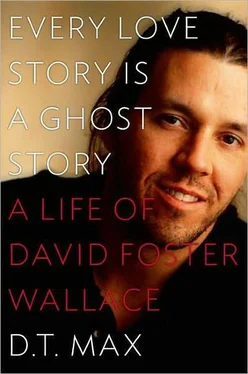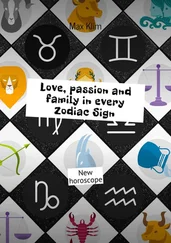Wallace’s recovery friends were much in evidence in his new home. Many of them were handy, and they were vigilant that the impractical Wallace not get ripped off by their own. His best friend from recovery, Francis B., built his bookshelves. Another put in a cutoff switch for his main electrical cable; Francis B.’s mother volunteered to clean Wallace’s house; soon she was doing his wash, with Wallace hiding his underwear from her before she got there. She would cook for him or pick up a roast chicken at his favorite restaurant and stick it in his empty fridge while he was teaching or at a meeting. One time when the handle on his screen door came off, Wallace called Francis B.: “How much is a new screen door going to cost me?” His friend came by with a screwdriver. Wallace exaggerated his helplessness. It was at once a gesture of generosity and of selfishness. The others took pleasure in helping, and Wallace got things done that he didn’t have time or aptitude for.
In March 1995 Colin Harrison asked Wallace to go on a Caribbean cruise and write about it for Harper’s . He and Kymberly were split up, at least for the moment. Spring break was coming and, offered the chance to get away from the cold and the never-ending revisions to Infinite Jest , he accepted. Once again he would join the American hordes dosing themselves on fabricated amusements. He would sample shuffleboard, endless buffets, onboard talent shows, and whatever else came his way. But, as ever, he was unsure how to proceed. The hopes of editors always made him nervous. He asked Costello and Franzen if they would join him, but neither was available, so alone he flew to Fort Lauderdale, from which the ocean liner MV Zenith —dubbed by him the Nadir —was slated for a weeklong circuit around the Gulf of Mexico. From the ship, Wallace called Harrison and asked what the magazine was looking for. Harrison told him to just “Be yourself. Enjoy. You’ll find the story.”
There was an immediate problem. Shipboard life was full of alcohol and Wallace didn’t drink. There would also be no recovery meetings on board. In compensation he smoked plenty of cigarettes. “Prospects for an acute and fecund belle-lettristic essay on cruising in ’95 are looking bleak,” Wallace wrote Franzen from Playa del Carmen. “Everything but the shuffleboard court is restricted. The atmosphere summons images of a floating range of Poconos.” Wallace felt lonely, awkward, and on a false footing and spent most of his time in his cabin or in the ship’s library. He was relieved when the trip was over and he was back on shore. On his way home in late March he stopped in New York, visiting Pietsch to talk about his manuscript, and stayed with Franzen for a few days in Jackson Heights in Queens, where his friend was now living. Franzen tried to get Wallace to cut back on the blondies, while Wallace made fun of the tidiness of his friend’s household. They bickered but more affectionately — work was on the whole going well for both of them now. Wallace was still wary of anything to do with cities and sophisticated city people but one night Franzen took him to a gathering hosted by Open City , a literary journal, at a Manhattan nightclub. It was not a scene Wallace felt very comfortable in, a party full of alcohol and drugs. During the evening he met Elizabeth Wurtzel, a writer whose memoir of depression, Prozac Nation , was a current hit. Wurtzel had struck a provocative pose on the cover of her book in a flesh-colored T-shirt, mid-riff exposed, and when Wallace questioned why, she told him it was what you had to do to sell a book. He demurred, citing his duty to art and other DeLilloesque objections. But Wallace was smitten by her silver lamé leotard and walked her home. In the lobby of Wurtzel’s building, as she remembers, he spent more than an hour trying to persuade her to let him come upstairs. He told her it would be a therapeutic favor. She told him if he stopped chewing tobacco he’d have a better chance.
Trivial as the encounter was, it stayed on Wallace’s mind. Wurtzel was a breathing symbol of temptation to him, Salome to Leyner’s antichrist. He had never met anyone as self-involved as he was, someone, moreover, with a history of depression, yet whom fame and drugs had not pushed into collapse. It was another glimpse of the alternative universe he had last seen at Yaddo with McInerney in 1987, the lure that the decisions he’d made about celebrity were not the only ones possible. He quickly inscribed a copy of Broom to her. “Not my best thing, by a long shot, believe me,” he noted on the title page. Wallace was in a happy time in his life, but all the same Wurtzel prompted a long letter full of recursive agonizing that he wrote soon after he got back to Bloomington:
I go through a loop in which I notice all the ways I am — for just an example — self-centered and careerist and not true to standards and values that transcend my own petty interests, and feel like I’m not one of the good ones; but then I countenance the fact that here at least here I am worrying about it, noticing all the ways I fall short of integrity, and I imagine that maybe people without any integrity at all don’t notice or worry about it; so then I feel better about myself (I mean, at least this stuff is on my mind, at least I’m dissatisfied with my level of integrity and commitment); but this soon becomes a vehicle for feeling superior to (imagined) Others…. It has to do with God and gods and a basic sense of trust in the universe v. fear that the universe must be held at bay and micromanaged into giving me some smidgeon of some gratification I feel I simply can’t live without. It’s all very confusing. I think I’m very honest and candid, but I’m also proud of how honest and candid I am — so where does that put me.
He told her how hard it was for him when he wrote to discern the difference between caring about the reader and caring that the reader cared about him:
The crux, for me, is how to love the reader without believing that my art or worth depends on his(her) loving me. It’s just about that simple in the abstract. In practice it’s a daily fucking war.
By now, the cruise ship experience had begun to cohere for him. He was merging the miserable time he had had on board into his larger themes. He produced an overstuffed meditation, twenty-four pages in the magazine, on the mistaken American belief that pleasure can do anything other than stoke the need for more pleasure. Early in the article he declares:
I now know the difference between straight bingo and Prize-O. I have seen fluorescent luggage and fluorescent sunglasses and fluorescent pince-nez and over twenty different makes of rubber thong. I have heard steel drums and eaten conch fritters and watched a woman in silver lamé projectile-vomit inside a glass elevator. 7
Wallace explored the various types of cruise self-indulgence, from shuffleboard (“thanatopic,” he called it) to the daily “eleven gourmet eating ops” to skeet shooting. He told the story of having missed a clay pigeon by a wide margin and watching it sink into the ocean: “Know that an unshot discus’s movement against the vast lapis lazuli dome of the open ocean’s sky is sun-like — i.e., orange and parabolic and right-to-left — and that its disappearance into the sea is edge-first and splashless and sad.”
“Sad” became the tocsin ringing through the piece, sadness as the consequence of too much plenty: sad waiters, sad cruise ship — goers taking pointless videos of other sad people pointing video cameras at them from their own cruise ships, and sad, senseless attempts by Americans to amuse themselves in the absence of any larger spiritual idea. “Choose with care,” Marathe warns in Infinite Jest . “You are what you love. No?” Wallace’s cruise ship piece was about the price of failing to choose well.
Читать дальше












